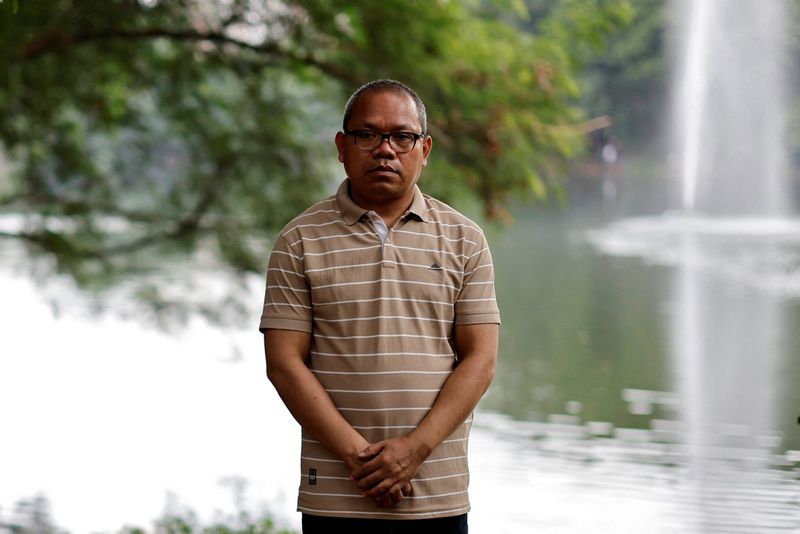By Krishn Kaushik, Maksud Un Nabi and Ruma Paul
DHAKA (Reuters) – Bangladesh indigenous folks’s rights activist Michael Chakma says he was woken up by his captors earlier this month in the dead of night, tiny cell the place he was being held and thrown right into a automotive, handcuffed and blindfolded.
“I thought they will kill me,” he stated. As a substitute, he was freed.
It was 5 years, Chakma advised Reuters, since he was kidnapped by armed males exterior a financial institution close to the capital Dhaka. Since then, he stated, the world exterior didn’t know the place he was or if he was even alive.
He was questioned about his opposition to then-Prime Minister Sheikh Hasina and crushed for weeks, he stated, however then left alone in certainly one of what he stated had been “hundreds” of cells with no daylight at an unknown detention facility.
Hasina had dominated the South Asian nation of 200 million folks for the previous 15 years, marked by arrests of opposition leaders, crackdowns on free speech and suppression of dissent, and he or she resigned this month within the face of lethal student-led protests that killed a whole lot.
Investigations into how a whole lot of individuals had been “disappeared”, and a few executed, throughout her tenure are a precedence for the interim authorities led by Nobel laureate Muhammad Yunus.
Human Rights Watch stated in a report in 2021 that in response to Bangladeshi human rights teams, almost 600 folks have been forcibly “disappeared” by safety forces since 2009.
It verified 86 enforced disappearances instances by which the destiny of the victims stays unknown. Others had been freed, proven as arrested or discovered lifeless, it stated.
The rights group and activists say the victims had been held in numerous detention centres throughout the nation and any involvement of the military, paramilitary or police may pose a problem to the interim authorities’s investigations.
Spokespersons for Bangladesh’s army and police didn’t reply to requests in search of remark.
Hasina, who resides at an undisclosed location close to the Indian capital New Delhi, couldn’t be reached. Her son Sajeeb Wazed, who lives within the U.S. and has been talking on her behalf, didn’t reply to questions on these allegations.
The federal government has fashioned a five-member fee, headed by a former excessive courtroom choose, to probe the disappearances.
“There are concerns that perpetrators might try and cover up their crimes,” stated Asia Deputy Director for Human Rights Watch Meenakshi Ganguly. “As a first step, the security forces should release all those that are disappeared, or if they were killed in custody, provide answers to the families.”
‘DIFFICULT TO BREATHE’
Chakma was freed on Aug. 7 in teak gardens close to Chittagong district in southeastern Bangladesh, round 250 km (150 miles) from Dhaka. He stated he didn’t know then that Hasina had been ousted from workplace and fled to neighbouring India lower than two days earlier.
Sitting in a small room with a desk and some plastic chairs in an house in Dhaka, Chakma, a brief, stocky man, managed his tears as he shared his ordeal.
“It was difficult to breathe. Initially, they told me that they would release me soon, but as months and years passed, I gave up hope of getting out. Each day felt like 100 days there.”
No less than two different folks had been freed after what they stated had been years of secret detention on the identical day as Chakma, however few particulars have emerged on who held them and the place.
The interim authorities stated this week the fee will “investigate enforced disappearances that occurred” since Jan. 1, 2010 “allegedly involving members of the police” and arms of the paramilitary, intelligence and army.
Nur Khan, a member of the fee and a outstanding human rights activist in Bangladesh, advised Reuters that the members are but to satisfy so it was “very difficult to talk about how optimistic we are about the success of the commission.”
However, he added: “With the forming of this commission the victims and their families at least have a platform from where they can seek fair trial and punishment for the perpetrators.”
Reuters spoke to fifteen folks, together with victims of such detentions, households of some who’re nonetheless lacking, human rights advocates, authorities officers and observers, in regards to the problem to hunt justice.
One was Shafiqul Islam Kajol, a photojournalist in Dhaka who says he was kidnapped by a bunch of eight or 9 folks at gunpoint close to Dhaka College in March 2020.
Speaking to Reuters from London, he stated: “They beat me a lot there.”
Between threats of killing him, he stated his captors requested him about what he knew about Hasina.
“They tortured me… I used to bleed from my nose and mouth,” Kajol stated.
After 53 days in captivity, he says he was left close to a border city and promptly arrested by Bangladesh’s border police. He was launched in December, 2020, after the courts acquitted him of trespassing fees.
Kajol went to London on a go to final 12 months and utilized for asylum, which continues to be below evaluate.
“I want to return to my country if I get security. I want to file a case against all those who disappeared me, including Sheikh Hasina,” Kajol stated.
Chakma additionally stated he was prepared to depose earlier than the fee however fearful about his security.

“There were many people involved in these crimes, and they remain strong.”
These folks have “created a system that is beyond all accountability, so I am not sure how much this government can change them”, he stated.




